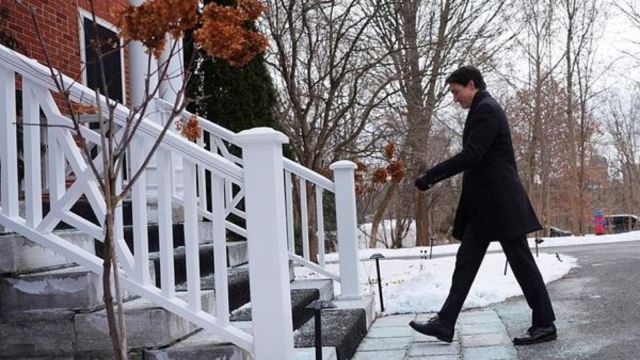

Jan 8, 2025 16:49 IST First published on: Jan 8, 2025 at 16:17 IST
Der lagi aane mein tumko, shukr hai phir bhi aaye to (You took your time to arrive, but I am glad that you are here). So goes Andaleeb Shadani’s famous ghazal. This sentiment was quite palpable on Monday among those in Canada who had been waiting for Justin Trudeau’s resignation. For the past 18 months, the Trudeau government had witnessed a consistent decline in popularity as the Canadian public battled inflation, unemployment, and a housing crisis. Gradually, the calls to resign that came from the conservative opposition also found their way into the Liberal Party, and its allies, including the New Democratic Party (NDP) led by Jagmeet Singh (for now).
But it wasn’t always like this. In 2016, as Americans reckoned with the possibility of Donald Trump becoming the US President, many half-jokingly said that they would move to Canada in such an event — after all, the country had recently gotten a new Prime Minister who was a liberal poster boy, had a diverse cabinet, and was talking about climate change and the need to reach out to Canada’s much discriminated-against indigenous communities. To Americans facing astronomical healthcare costs, racism, and a debased political discourse, Canada in those days seemed the closest to a liberal utopia. For some time, things continued this way, even if Trudeau only came back with a minority government. Even during Covid, Trudeau’s handling of the crisis was seen in stark contrast to the floundering Trump administration.
However, it was post Covid that things went south. The expected post-pandemic boom did not come, lines at hospitals became longer, cost of living increased, and it became near impossible to own a house. And soon, the mood changed. Out from the right field emerged the conservative leader Pierre Poilievre, playing a familiar tune — immigrants are taking your jobs, pushing up the cost of housing, and that Trudeau’s “socialist” policies were driving industry away. The reality, of course, was much different — while Canada looked like a welfare-state haven in comparison to its dysfunctional southern neighbour, inequality in the country had increased dramatically, with the 1 per cent reaping the benefits, and the takeover of the housing market by haute finance meant that most people were “priced out”. The pandemic and the war in Ukraine made things worse. Amidst all this, migrants became an easy distraction.
Trump’s recent victory complicated things further — his remarks calling for the absorption of Canada as the 51st state and slapping 25 per cent tariffs put Trudeau in a difficult and embarrassing position. His opponents called him weak and called for a strong response to Trump. Privately though, everybody understood the reality — Canada’s dependence on the United States meant that the incoming government had to be pacified, public stances notwithstanding. Perhaps, someone who understands this the most is Poilievre, who is trying to harness the political winds blowing from the United States to fashion Canada’s political environment. Also, the fact that Elon Musk is now trying to fan a neoliberal and conservative ascendancy across the Anglo-Saxon world by supporting Poilievre and openly mocking both Trudeau and Keir Starmer in the UK points to the fact that the political drama playing out in Ottawa is not solely domestic, but part of a greater reconfiguration in the Anglosphere.
That being said, the domestic situation in Canada has changed considerably. A few hours after Trudeau’s announcement, a statement was put out by NDP’s Singh, who was then criticised for trying to wash his hands off the whole affair and throwing Trudeau under the bus. His critics are accusing him of political opportunism, as they argue that Singh’s delay in pushing for a no-confidence motion over the past year was due to his desire to secure a lifetime pension for himself. In contrast, the Green Party leader Elizabeth May has been praised for a more gracious public statement in which she thanked Trudeau for his services, while at the same time pointing out the failures of the Liberal Party. Perhaps the most interesting churn is happening within the Liberal Party — like the Democrats in the US, many are tacitly calling for a more “centrist” position in order to distance themselves from Trudeau and improve their electoral prospects.
This is also where things are looking uncertain — it is not clear how quickly the Liberals will be able to appoint a new party chief and an interim Prime Minister. They will have to clean up their act fast, because they will have to pass a money bill by March 24 that will essentially allow the Canadian government to pay its bills and salaries. In other words, keep things running. Also, while elections are technically scheduled for October, the political instability means that most likely they will happen sooner. And what will happen next is anybody’s guess. While Poilievre may be gaining ground (and most importantly, funds), a not insignificant number of Canadians consider his brand of politics to be anathema. However, what helps him is that the Liberals face anti-incumbency, and alternatives such as the NDP stand discredited because of their previous closeness with Trudeau’s government (there are also murmurs that Singh may face leadership challenges from within his party). Also, with many within the Liberal Party shifting to centrist positions, they may not offer a compelling ideological alternative to voters.
most read
So, what does that mean for us? Firstly, Trudeau’s exit may give space for a India-Canada rapprochement, especially as Poilievre has said that he does not want to get involved in “the world’s ethnocultural conflicts”. This may be cause for celebration for some in New Delhi. At the same time, the anti-H-1B discourse in the US and the anti-immigration sentiment in Canada reinforce each other, which means Indians may face increasing racism and dwindling employment opportunities. This may exacerbate the problem of unemployment within the country, as skilled labour may find it difficult to get absorbed. Furthermore, many Indians may find themselves at the receiving end of racist prejudice and derision that has now spilled into mainstream online discourse. For Canadians, the proposed conservative remedy may be worse and make their lives even more precarious. Together, these changes may be part of a larger global-historic moment — the gradual unravelling of the liberal world order led by the West. In other words, the American/Canadian dream may be over, and it is time to wake up from slumber.
The writer is assistant professor, International Relations, Ashoka University. Views are personal
Discover the Benefits of Our Subscription!
Stay informed with access to our award-winning journalism.
Avoid misinformation with trusted, accurate reporting.
Make smarter decisions with insights that matter.
Choose your subscription package


